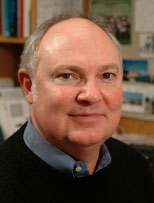 |

Friday Evening Lecture Series
 |
|
|
|
07/29/05
In Praise of Simple Minds: What the Study of Learning in a Marine Snail Can Tell Us About the Biological Origins of Cognition
David L. Glanzman, University of California, Los Angeles
Introduction by Barbara E. Ehrlich, Yale University
Lecture Abstract:
Until relatively recently, the idea that invertebrate organisms could learn was regarded as controversial. Work from many laboratories during the past several decades, however, has established unequivocally that invertebrates learn. Somewhat unexpectedly, scientists have found that the neurobiological mechanisms of learning and memory in invertebrates are highly similar, and perhaps identical, to the mechanisms used by mammalian brains, including our own, to acquire and retain memories. This remarkable parallel between vertebrate and invertebrate mechanisms of learning and memory suggests that nervous systems acquired the capacity to learn relatively early, and that the neural machinery that underlies learning has been highly conserved during evolution.
David Glanzman is a Professor of Physiological Science and Neurobiology at the University of California, Los Angeles (UCLA), where he has been a faculty member since 1990. He received his B.A. degree from Indiana University cum laude and with honors in psychology. He earned his Ph.D. degree in experimental psychology at Stanford University. He then undertook postdoctoral training in cellular neuroscience with Frank Krasne at UCLA, and with Eric Kandel at the Howard Hughes Medical Institute, Columbia University. In 2004 Dr. Glanzman, an MBL Corporation Member, was awarded the prestigious Senator Jacob Javits Award in the Neurosciences from the National Institute of Neurological Disorders and Stroke (NINDS). The award, which honors the late U.S. Senator Jacob Javitz, is presented to investigators who have demonstrated exceptional scientific excellence and productivity in research areas supported by the NINDS and who are expected to conduct cutting-edge research over the next seven years.
Dr. Barbara E. Ehrlich received her Ph.D. in Physiology from UCLA in 1979 and is currently a Professor of Pharmacology at Yale University. She studies regulation of intracellular calcium and is particularly interested in calcium movement through IP3-gated channels, ryanodine receptors, and the proteins involved in polycystic kidney disease. Dr. Ehrlich first came to the MBL as a chambermaid in 1972 and as a course assistant in the Embryology course in 1973. She returned to MBL as a Grass Fellow in 1980 and has been a summer investigator every summer since (except one). Dr. Ehrlich served as an MBL Trustee from 1989 to1993. She was a member of the MBL s Science Council from 1993 to 1999, and in 2004 was re-elected a three-year term. She is currently Chair of the Science Council s Nominating Committee. Dr. Ehrlich was a faculty member of the MBL s Physiology Course in 2001 and 2002, and has lectured many summers in both the Physiology and Neurobiology Courses. She has served on four MBL committees, including the Research Services Committee in the 1980s, Nominating Committee in the 1990s, and the Election Committee in 2003. She is currently a member of the Fellowships Committee which she has been a part of since the 1990s.
|